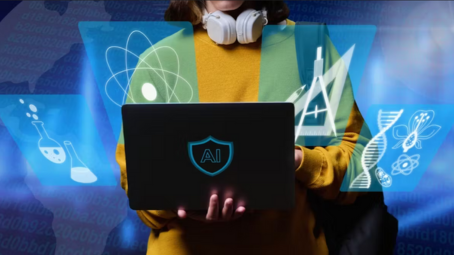Generative AI (genAI) is being used in education for different purposes. From the teachers’ perspective, genAI can support activities such as learning design. However, there is a need to study the impact of genAI on the teachers’ agency. While GenAI can support certain processes of idea generation and co-creation, GenAI has the potential to negatively affect professional agency due to teachers' limited power to (i) act, (ii) affect matters, and (iii) make decisions or choices, as well as the possibility to (iv) take a stance. Agency is identified in the learning sciences studies as being one of the factors in teachers’ ability to trust AI. This paper aims to introduce a dual perspective. First, educational technology, as opposed to other computer-mediated communication (CMC) tools, has two distinctly different user groups and different user needs, in the form of learners and teachers, to cater for. Second, the design of educational technology often prioritises learner agency and engagement, thereby limiting the opportunities for teachers to influence the technology and take action. This study aims to analyse the way GenAI is influencing teachers’ agency. After identifying the current limits of GenAI, a solution based on the combination of human intelligence and artificial intelligence through a hybrid intelligence approach is proposed. This combination opens up the discussion of a collaboration between teacher and genAI being able to open up new practices in learning design in which they HI support the extension of the teachers’ activity.
The field of artificial intelligence (AI) is rapidly evolving. Its new applications in diverse spheres of social life are evident daily. The following are the key developments in AI in 2024 (IBM, 2024; McKinsey Global Institute, 2024): ●Generative AI, ●Analytical AI, ●Multimodal AI, ●Shadow AI and corporate AI policies, ●Explainable AI, ●Regulation, copyright and ethical AI concerns. However, AI has no less impact on education. According to a report by Grand View Research (2021) the global AI in education market size was valued at $1.82 billion in 2021 and is expected to expand at a compound annual growth rate of 36.0% from 2022 to 2030. The current study presents the survey's findings about AI's role as a teacher and its impact in modern education. This target group for present time consisted of 182 participants (84% of them are educators). We employed a co-creative approach with AI during the study and also asked several Large Language Models (LLMs) by crafting suitable prompts that contained the same questions as those found in human surveys. We used such LLMs as ChatGPT 3.5, Mistral, Copilot, Perplexity, Gemini, Claude. Some gained results are in the appendix (figures 1-4). According to the results of the survey we can make the conclusion that the future of education will be a balanced blend of human expertise and technological support (Strutynska & Romero, 2024). References: 1. AI In Education Market Size, Share & Trends Analysis Report By Component (Solutions, Services), By Deployment, By Technology, By Application, By End-use, By Region, And Segment Forecasts, 2022-2030. URL: https://www.grandviewresearch.com/industry-analysis/artificial-intelligence-ai-education-market-report 2. IBM (2024, February 9). The most important AI trends in 2024. URL: https://www.ibm.com/blog/artificial-intelligence-trends/ 3. McKinsey Global Institute (2024, May 30). The state of AI in early 2024: Gen AI adoption spikes and starts to generate value. URL: https://www.mckinsey.com/capabilities/quantumblack/our-insights/the-state-of-ai 4. Strutynska O., Romero M. (2024). Teaching in the Digital Age: Will AI Teachers Replace Human Educators? [PowerPoint slides]. ResearchGate. Global Smart Education Conference. 18-20 August 2024, Beijing Normal University, Beijing, China. DOI: 10.13140/RG.2.2.18374.08005.
The field of artificial intelligence (AI) is rapidly evolving. Its new applications in diverse spheres of social life are evident daily. The following are the key developments in AI in 2024 (IBM, 2024; McKinsey Global Institute, 2024): ●Generative AI, ●Analytical AI, ●Multimodal AI, ●Shadow AI and corporate AI policies, ●Explainable AI, ●Regulation, copyright and ethical AI concerns. However, AI has no less impact on education. According to a report by Grand View Research (2021) the global AI in education market size was valued at $1.82 billion in 2021 and is expected to expand at a compound annual growth rate of 36.0% from 2022 to 2030. The current study presents the survey's findings about AI's role as a teacher and its impact in modern education. This target group for present time consisted of 182 participants (84% of them are educators). We employed a co-creative approach with AI during the study and also asked several Large Language Models (LLMs) by crafting suitable prompts that contained the same questions as those found in human surveys. We used such LLMs as ChatGPT 3.5, Mistral, Copilot, Perplexity, Gemini, Claude. Some gained results are in the appendix (figures 1-4). According to the results of the survey we can make the conclusion that the future of education will be a balanced blend of human expertise and technological support (Strutynska & Romero, 2024). References: 1. AI In Education Market Size, Share & Trends Analysis Report By Component (Solutions, Services), By Deployment, By Technology, By Application, By End-use, By Region, And Segment Forecasts, 2022-2030. URL: https://www.grandviewresearch.com/industry-analysis/artificial-intelligence-ai-education-market-report 2. IBM (2024, February 9). The most important AI trends in 2024. URL: https://www.ibm.com/blog/artificial-intelligence-trends/ 3. McKinsey Global Institute (2024, May 30). The state of AI in early 2024: Gen AI adoption spikes and starts to generate value. URL: https://www.mckinsey.com/capabilities/quantumblack/our-insights/the-state-of-ai 4. Strutynska O., Romero M. (2024). Teaching in the Digital Age: Will AI Teachers Replace Human Educators? [PowerPoint slides]. ResearchGate. Global Smart Education Conference. 18-20 August 2024, Beijing Normal University, Beijing, China. DOI: 10.13140/RG.2.2.18374.08005.
🔗 IA et Pédagogie : Comment structurer l’apprentissage avec la taxonomie de Bloom ? L’intelligence artificielle s’intègre progressivement dans nos pratiques… | 19 comments on LinkedIn
Un livre essentiel qui accompagne les enseignants et les élèves en collège et lycée dans l'utilisation de l'intelligence articificielle, pour relever les défis majeurs de l'éducation !
L'émergence rapide de l’intelligence artificielle (IA) ouvre de nouvelles perspectives dans l'enseignement, affirmant le rôle grandissant du numérique en éducation, tout comme dans d’autres secteurs.








